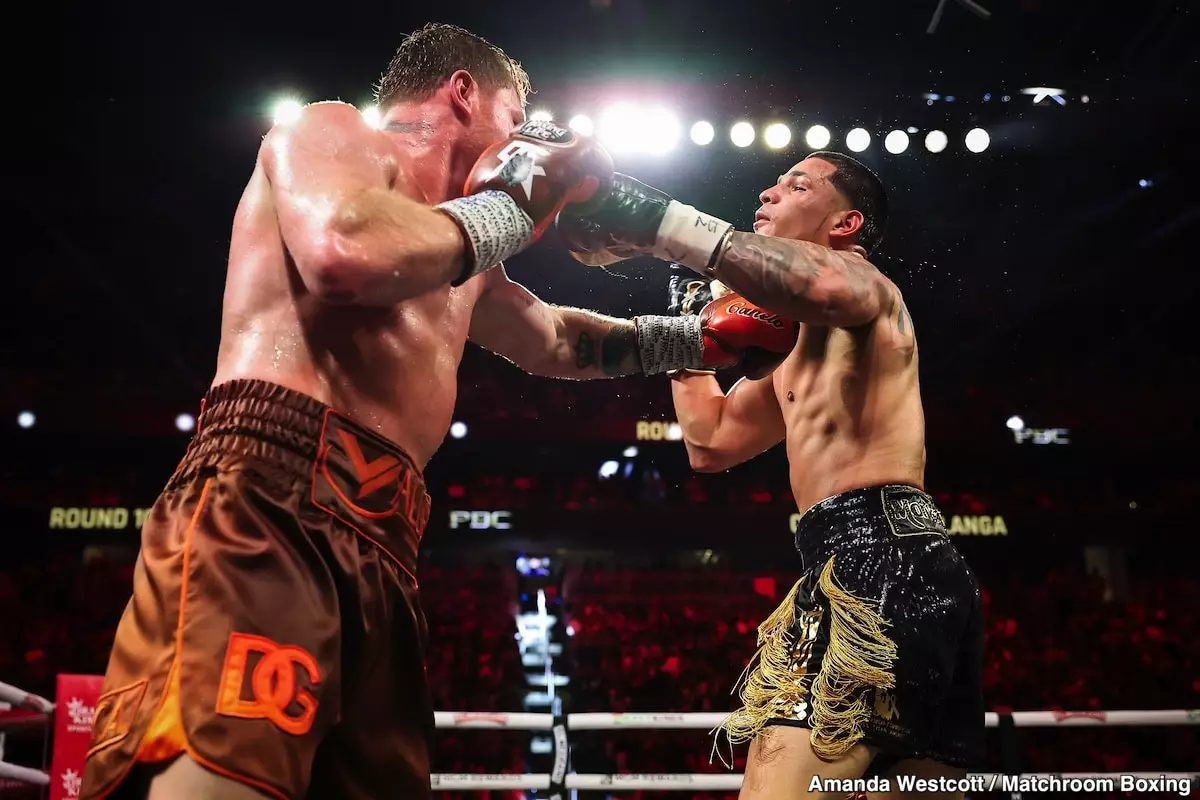The world of boxing is no stranger to rivalries, and the feud ignited between Edgar Berlanga and Gervonta “Tank” Davis exemplifies the drama and passion inherent in the sport. Recent events have escalated tensions between these two fighters, showcasing how personal afflictions can blend with professional pursuits. Berlanga’s bold proclamation that Davis is “not allowed in Puerto Rico” after the latter criticized his performance against Canelo Alvarez provides a captivating lens through which to examine this unfolding saga.
Edgar Berlanga’s viewpoint reflects an intriguing mentality that some may regard as misguided. Following his one-sided bout against Canelo Alvarez on September 14, where he fought valiantly yet ultimately fell short, Berlanga embraced the attention and hurled insults at Davis. He appeared to misconstrue the notion of taking pride in the mere act of sharing the ring with a boxing legend. Despite Davis labeling his actions as “celebrating failure,” Berlanga viewed the experience as a personal victory, albeit one that stands on shaky ground.
Berlanga, hailing from a pedigree that prides itself on resilience, seems to find solace in his participation. But is it really a cause for celebration? Engaging in a bout that many deemed predetermined, Berlanga did not effectively rise to the challenge, suggesting that he may not yet belong in conversations about elite fighters. Additionally, his apparent avoidance of other high-caliber opponents raises questions about his commitment to pursuing genuine greatness within the sport.
In stark contrast to Berlanga’s jubilation lies Davis’s dismissive commentary. He described Berlanga’s post-fight actions as “celebrating failure,” and his blunt honesty encapsulates the competitive spirit that characterizes professional boxing. Davis, known for his own illustrious career, has little tolerance for what he perceives as a lack of ambition. His critique serves the dual purpose of undermining Berlanga while fortifying his own brand, portraying himself as the fighter who takes no shortcuts to success.
For the boxing community, Davis’s remarks reflect the harsh realities of the sport, where loss can expose the thin ice upon which many careers are built. His refusal to sugarcoat Berlanga’s predicament emphasizes a culture that celebrates only victory – a stark reminder that being a contender requires rigorous training, mental fortitude, and an unwavering commitment to excellence.
In the intricate web of boxing rivalries, the fans often hold untold influence, shaping narratives and responses through their unwavering support. Berlanga’s assertion that he was celebrated in Puerto Rico illustrates how regional pride and loyalty can create a spectacle that overshadows the actual sport. However, it’s critical to consider whether this adoration truly holds merit, especially given the scale of the losses sustained in the ring.
For the spectators who invested in the pay-per-view event for an engaging clash, the predominant feeling was likely one of disappointment. Berlanga’s perceived failure to deliver a competitive fight led to questions about the broader entertainment value that boxing promises. Fans deserve bouts that excite and engage; watering down expectations with the narrative of a celebrated, albeit hollow, achievement risks alienating the very support that fuels the sport.
Looking forward, both fighters face the need for growth beyond reputations built on past accolades. Berlanga must grapple with the ramifications of his recent performance; he risks stagnation if he fails to secure significant upcoming matches or demonstrate real improvement. Meanwhile, Davis is tasked with maintaining momentum while deftly managing the psychological warfare that permeates the boxing narrative. The future of their rivalry will depend heavily on how each addresses their shortcomings and rises to meet the expectations rooted in their respective careers.
The intersection of personal animosity, professional aspirations, and fan reception creates a complex backdrop against which the paths of Berlanga and Davis will continue to collide. As both fighters navigate the unique challenges boxing presents, the overarching theme of rivalry serves to enrich the sport, proving that in the world of gloves and fame, the lines between victory and defeat often blur in unexpected ways.

